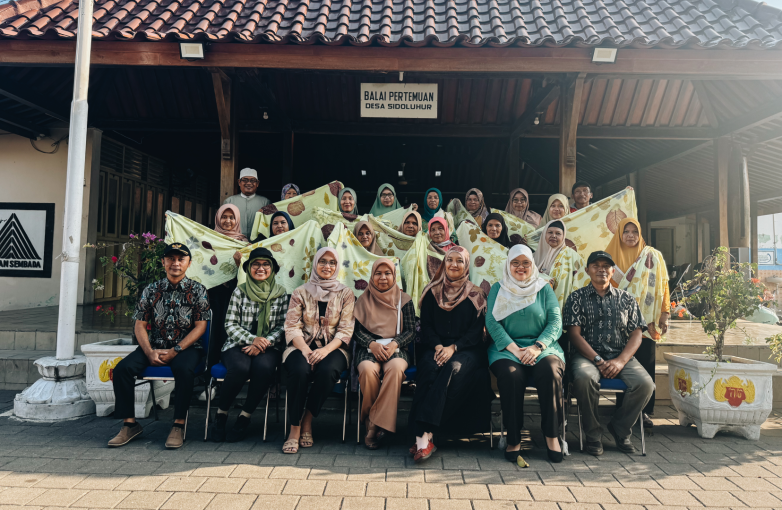
The Agricultural Extension and Communication Study Program, part of the Department of Agricultural Socio-Economics at Universitas Gadjah Mada (UGM), recently conducted a community service program in Sidoluhur Village, Sleman Regency. This initiative is part of the program’s commitment to supporting inclusive development by empowering communities through a local agro-economy approach. The activities included ecoprint training and the distribution of plant seedlings, with a focus on sustainability and empowering members of the “Luhur Jiwo” community, a group that provides opportunities for individuals with psychosocial disabilities (ODGP) to engage in productive and social activities.
The initial coordination meeting with Sidoluhur Village and the leaders of Paguyuban Luhur Jiwo was held on Friday, June 14, 2024. This meeting marked the beginning of planning for the community service activities, which involved various stakeholders, including the village government, community leaders, and strategic partners such as the health department and organizations supporting individuals with psychosocial disabilities. Discussions centered on the importance of integrating agriculture with social empowerment to enhance the self-sufficiency of ODGP members. Sidoluhur Village has successfully developed an inclusive farming model using 1,600 m² of leased village land to cultivate various crops and support the “Inclusive Education Garden for Disaster Preparedness” (Taksi Kencana).
As part of the service activities, a three-day ecoprint training was held on September 9, 10, and 12, 2024. The training, led by Hastin Sholikhah, S.Sn., was attended by members of Paguyuban Luhur Jiwo, ODGP, caregivers, and members of the local women’s farming groups (KWT) and Family Welfare Movement (PKK). Ecoprint is a natural printing technique that creates unique patterns on fabric using plants. Participants were trained in basic techniques such as mordanting, leaf arrangement, and steaming, using local plants like red castor leaves, jati ndeso, and Japanese papaya.
The training not only equipped participants with technical skills but also provided insights into product packaging and calculating Break Even Points (BEP) to enhance the marketability of ecoprint products. This initiative is expected to create new income streams for the community while promoting environmental sustainability through the use of natural materials.
In addition to the ecoprint training, the Agricultural Extension and Communication Study Program provided plant seedlings that could be used in future ecoprint production, such as red castor, jati ndeso, and African wood. These seedlings were planted in the village-managed land overseen by Paguyuban Luhur Jiwo. To ensure successful cultivation, a plant cultivation training was also conducted by Dr. Rani Agustina Wulandari, S.P., M.P., a lecturer from UGM’s Department of Agronomy. The training covered various stages of cultivation, from seedling to post-harvest processes, aimed at enhancing the community’s ability to manage sustainable agricultural enterprises.
This community service program directly supports several Sustainable Development Goals (SDGs), including:
SDG 8: Decent Work and Economic Growth – By providing skills in ecoprint and plant cultivation, this program promotes job creation and increases economic opportunities for the community, including ODGP members.
SDG 12: Responsible Consumption and Production – The use of natural materials in ecoprint training supports sustainable and environmentally friendly production practices.
SDG 10: Reduced Inequalities – By involving ODGP in productive activities, the program aims to reduce social inequalities and provide inclusive opportunities for all community members.
With these community service initiatives, Sidoluhur Village is expected to continue growing as an inclusive village capable of fostering economic self-sufficiency while contributing to environmental sustainability through a local agro-economy-based approach.
Author: Adhika Hafizh Prasada, S.P.
Admin of the Website for the Department of Agricultural Socio-Economics, Faculty of Agriculture, UGM
